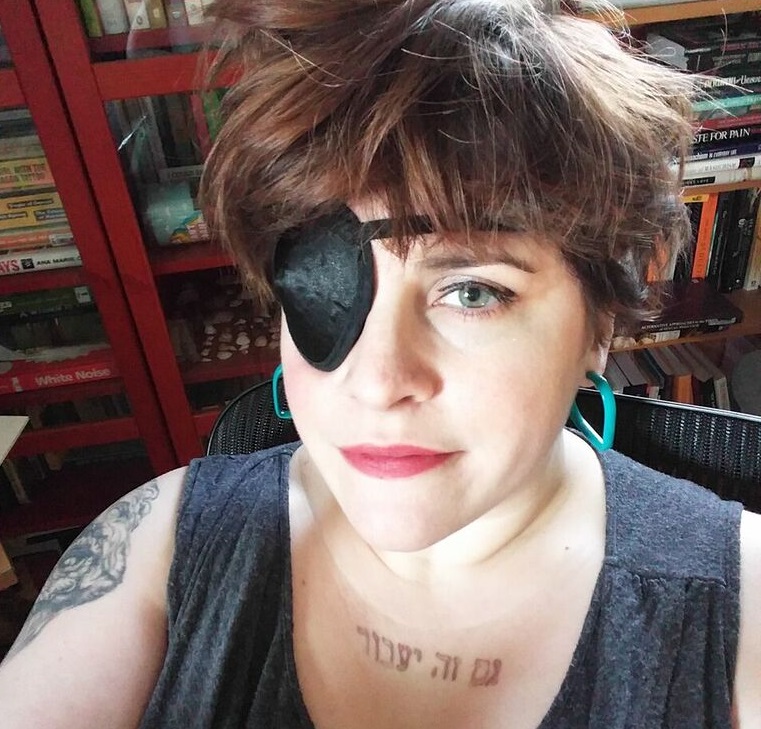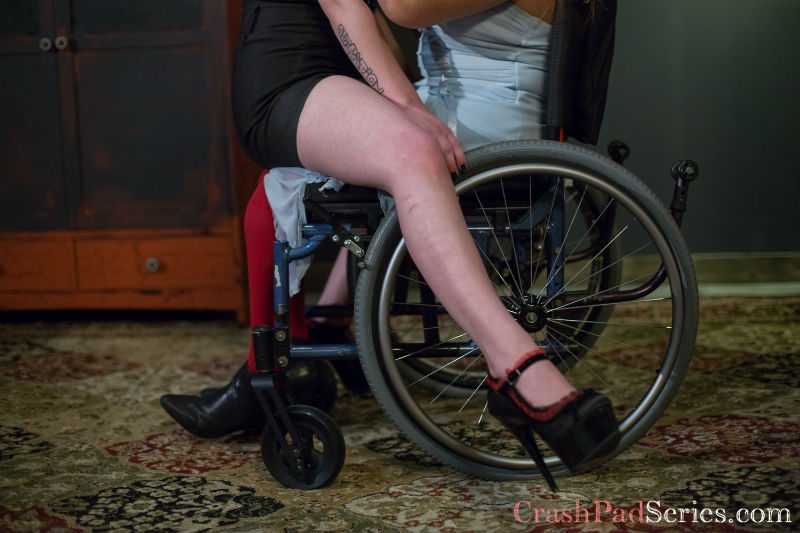A three-part series featuring queer disabled voices.
There is a myth, amongst the nondisabled, that disabled people are not sexual. Not just among them, though, for we disabled people are fed this myth too. As a sexual/erotic performance artist and disability justice advocate with an apparent physical disability, I have been asked to speak on this topic many times.
In recent radical fringe to more mainstream writing and media, more efforts are being made by both disabled and nondisabled thinkers to put these two words and concepts into conversation with one another. I’m excited by this conversation. And I want to expand it.
It’s not enough to say that disabled people are sexual. I don’t need to shock the uninitiated anymore. Disabled people are sexual. Yes! And disabled people are also romantic, sweet, hot, in love, out of love, hungry, masochistic or sadistic, creative, communicative, desirous. Some of us are even gay (or queer, bi, lesbian, you name it)! We are not these things necessarily because of or in spite of our disabilities. But our disabilities have taught us a lot about how to have a body.
And how to have a complicated body that wants complicated things. We are alive, dynamic beings, capable of complex feelings and desires. It is possible for our desires to be numerous, to shift, to change shape, for we are also numerous, diverse, and changing.
In September of last year, I sent out a call for participants to complete a survey I created about queer (read lesbian, bi, or queer people of complex genders who love people of complex genders) disabled sexuality. I posted this call on my various social media platforms and networks, including some queer and disabled specific Facebook groups I’m in. I got about 30 interested emails, and by the end of it, nine people sent me answers.
My interviewees identify not only as disabled and queer, as multiply disabled and multiply queer, but also at turns as artists, nerds, punks, dancers, geeks, mothers, sex workers, poets, activists, feminists, daughters, siblings, lovers, and friends. I heard from queer disabled people who identify as fat, as gender non-conforming, as people of color, as white, as Jewish, as the children of immigrants, as mixed race. Their sexuality and bodies are all wrapped up in all of this. I’m focusing on the relating and sexing for this article, but it’s only a fraction of the pie. In parts or whole, the pie is delicious.
Many of us lesbian or queer girls and gender unaffiliated people’s understand that there is a moment, in fact usually several moments, when you come out. What a lot of us don’t grasp though, is that being disabled requires coming out too! Who is the first person you came out to? This is sort of a trick question, because I’m pretty sure the first person you came out to was yourself. While there are some who exhibited such strong Sapphic tendencies at various tender ages so as to elicit the notice of others, many of us had to come out to ourselves before we could come out to other people, and sometimes those people were less than supportive:
“My mom had a hard time when I came out as bisexual. She replied “What do you want… a medal? Do you expect me to be proud of this?…She’s much better now. It sounds silly (or maybe cliché?) but Ellen Degeneres helped with that. She always thought Ellen Degeneres was really funny and if she was that funny, how bad can Lesbians be?” – Michele
If someone is born with an apparent (as in others can tell by looking at you or being around you) disability, you might think that understanding oneself as disabled is simple. But it’s not. It wasn’t for me. For most of my life, though I could think of myself as what Mia Mingus calls “descriptively disabled” (it was hard to deny the cashew curve of my feet, the halted reach behind or above of my arms, the fact that I couldn’t weight bear without orthopedic braces and other assistive devices, or that I didn’t learn to walk until I was three, and even then it wasn’t my favorite style of mobility), identifying with my disability with any sense of pride was not anywhere near my awareness. My sexuality became a point of obsession and focus for me throughout my adolescence. Over a decade later, I would find people who were both disabled and queer.
I asked my participants which came first for them, identifying as queer or identifying as disabled, and whether or not the two informed one another.
“Disability came before any kind of sexual awakening, and the only way I can remember certain parts of my life is when I use the awakening of my disability as a checkpoint. I remember I was starting a new school at my church and I was crushing on a female friend who went there. I never told her.” – Chiara
“Queer first. I didn’t know that mental disabilities were disabilities until I was in college. I just thought I was a fucked up person. They are as extricable as any other aspects of my identity.” – billie rain
“I was disabled before I was gay, but knew I was gay before I identified as disabled—so it’s complicated.” – Sarah
You’d think that no one would have a problem with a disabled person identifying as disabled. But they do. Just like homophobic people who think that it’s choosing a sadder, harder, or unnatural life path when one comes out as queer, ableist, albeit well meaning people will try to tell us that we shouldn’t identify as disabled. That we are “more than our disabilities” and that we can make ourselves better if we just try harder.

“Being bi or queer was accepted far more or better than being sick or disabled was – as a teenager and even to this day (I’m now 34). I do find that there are a lot of queer crips, and in that community the coming out is concurrent and is accepted positively.” – Cassandra
“I lost friends when I became disabled, not because of ableism on their part, but due to them not understanding my new and different needs.” – Angie
“I’ve been told that identifying as disabled is defeatist…Most of my medical conditions run in the family, so we pretty much all have being sick/disabled in common, though my family rarely uses the term ‘disabled.’ I know they support me in my disability rights activism, but I’m not sure if they see it as detached from my identity.” – Kira
“I was queer before I was disabled. I actually first came out as a lesbian and then realized my sexuality was much more broad than that. I became disabled later in life, and it was really hard for me to accept an identity as disabled. I kept imagining, after the accident, that someday I’d get all better and it was just a matter of physical therapy, etc. I’ve accepted and embraced the identity now, but other people still have a hard time with it.” – Jacqueline Mary
One participant, Amber, pointed out that some disabled women, particularly those who grew up with disabilities and might identify as queer choose not to come out or to repress it so as to avoid further othering themselves in society. This idea came to my attention when I was 20, and saw a sex ed presentation by the Empowered Fe Fes of Chicago, an awesome disabled girl education organization and support network, that includes no info on queer or trans sexual health or experience in their comprehensive sexual health guide, which you can find online. One of their mentors spoke to my young and militantly queer self after the presentation which I had piped up during, telling me, “We have disabled kids coming by all the time who are afraid to come out.”
To be continued…
Resources:
Radical Accessible Communities
Sick and Disabled Queers Facebook Group
Sex and Disability anthology edited by Robert McRuer and Anna Mollow
